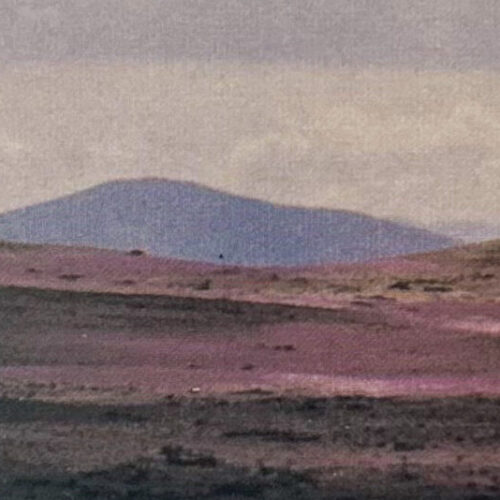The sun is my drug. The light spirals the ice sheet and fades only with clouds and thick storms and wind that howls. I could stay awake through this longest of southern days. I could stare into the yellow tent fabric flapping frosted condensation onto my sleeping bag. I could throb in this light forever.
From morning through night, the sun parallels the horizon. Circling and swallowing and erasing time. My eyes are overloaded. Every night I wake in the midnight light believing I’ve slept too long. I wake at two, four, and again at five. In between, I sleep deeply, but I stir. My body wants less sleep; my mind wants more.
In the glow of the tent, my mind slows and slows. But it’s too late; my body hasn’t calmed. The brightness of Antarctica seeps into my brain, turns days into months, and keeps weeks endless. Snow and light and distance engulf me.
I watched the Twin Otter of the British Antarctic Survey bank into the distance this morning, and I thought how close those other worlds are to them. The worlds I knew months ago. The other field camps that seem big enough to be cities.
Then the pilot and his airplane were gone, and the camp was quiet. The wind calm, the shadows dark, the clouds like mountains on the horizon. Here, the days tick like metered numbers. The tent flaps in the wind. This big golden glow glazes the evening. I am left on the ice sheet.
While I’m grooming the skiway for the next plane, burying the Caterpillar’s tracks deep in snow, building pallets of cargo that drift over in the night, washing dishes, shoveling snow, snow, always more snow, I battle the pattern of wanting. I try to put it aside with patience I don’t have. I wait twelve hours, and twelve more, and soon the mornings to nights and nights to mornings will become weeks and months.
I’ll miss the piercing pastel sky and the glitter of frost flowers growing on the walls of the freezer trench. I’ll miss the quiet hum of the diesel stove and mornings alone with the wind, the sat phone, and the hourly clock calling me to weather observations for the plane that won’t come for weeks. I’ll miss out on the pleasures of red cabbage, radishes, and soft-boiled eggs that arrive by aircraft. The satisfaction of mail, handwritten notes and messages from faraway places. Of the wind on my tent. The warmth of toast and honey after hours of biting cold.
Where else can I find this moment, so haunting and engrossing, so painful?
Our crew of four watches The Big Lebowski and makes White Russians. I write funny letters on half-naked magazine photos of Kate Moss. I listen to Jad Abumrad on Radiolab while bucketing with the loader the five-foot drifts that bury our doors.
In the dark of the science tent, I stare at the electric blue of the computer screen, mesmerized by the neon light of an ended movie. I miss true, pervasive darkness. I yearn for it like I yearn for fruit, unfrozen vegetables, milk, and clean clothes. I’m tired of Carhartt overalls, tired of solar showers, tired of wind on my face. I’m counting the days.
I return to my tent to lie again under two sleeping bags and the low midnight light: the long shadows, the whiskey gold, the clatter of wind. Tomorrow brings the surprise of another day, another encounter with a sameness unlike any other. I’m saturated, overflowing with emptiness.
I wake to the rising morning light. The sun hovering at the horizon. The snow heavy and hard and crunching below my slippers. I walk from my tent toward coffee, the light blinding, the wind stinging. Above, the sky deep blue but fading to muted yellows and eventually the pale pink of cold, cold mornings. I leave prints through the hoarfrost. My eyes freeze with each blink in the bitter cold. I bury my chin in my scarf, turn my head from the prevailing wind, and follow the packed trail to the galley, the diesel stove, the coffee.
Camp soon gets crowded again with carpenters and pilots and mechanics that pry into our spinning. We take apart the Weather Ports and pack up the diesel stoves, the fuel barrels, the tractors. We build long high snow berms and stow everything in tall stacks to be buried by winter and darkness.
We fly from the skiway strapped in the web seats of the LC-130. Our cargo pallets shift in the rails of the fuselage between us. I’m nauseated by the diesel fumes blasting through the heaters, the earmuffs digging into the sides of my head, the roar of the engines. Together, we smell of three months of working, battered people. With a three-hour flight, the distant world crashes in. We return to the largest station on the southern coast of the Southern Ocean. To so many planes and bigger tractors and the buzz of a near city of chaos.
And days later, I fly north again, to New Zealand, to everything else. To all that is not the ice.
I take hot showers, order Americanos, and make green salads with sliced cucumbers. I wear jeans and earrings, go for trail runs in wet forests and buy vitamins on Amazon. And then, in weeks and months and quick years, turning in repeat, I’m shopping for bedsheets and buying curried chicken salad at the deli and staring at a computer screen from my Tempur-Pedic swivel chair. Everyone hurries.
Those distant years of cold and hums and blasting wind gnaw at these new days of just fineness. I kept going to the ice and coming home, then going and going back again. This looking back to life on ice sheets is my longing and resisting and torment and fierceness. I can’t let go of the place I wanted to escape. A home that hated me, a home that tore me to pieces. The place that now holds me together.
The ice haunts me beautifully. The emptiness enveloping, the loneliness breathtaking. Those skies stained my eyes, and my insides still roll at the rhythm of the wind — far away, piercing, possessive.
I left part of me in the galley module on the ice sheet. Next to the Laphroaig and the scribbled welcome we left on a note for those who would walk into that shelter two years later. I still stare back into those days. To try to understand the years I spent returning to the ice and the cold shimmering skies. To the scarcity and all the space that emptied me.

Tara Kramer
Tara Kramer spent the last 13 years working in Greenland, Antarctica, and Canada for the U.S. Polar Programs and Polar Bears International. Her writing has been featured in Alpinist, Patagonia’s The Cleanest Line, WhitefishReview, Nowhere, and Waymaking: an Anthology of Women’s Adventure Writing, Poetry and Art. She’s an MFA candidate in nonfiction writing at Antioch University and is based in Livingston, Montana with her longtime love, Nick.



